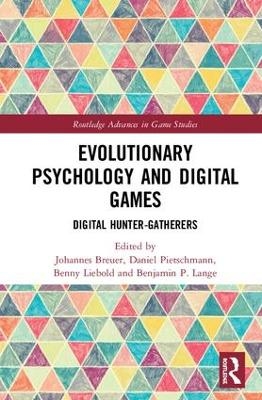
Evolutionary Psychology and Digital Games
Routledge (Verlag)
978-1-138-06379-2 (ISBN)
Theories and Methods
Emotion and Morality
Social Interaction
Learning and Motivation
These topics reflect the main areas of digital games research as well as some of the basic categories of psychological research. The book is meant as a resource for researchers and graduate students in psychology, anthropology, media studies and communication as well as video game designers who are interested in learning more about the evolutionary roots of player behaviors and experiences.
Johannes Breuer is a senior researcher at GESIS – Leibniz Institute for the Social Sciences, Germany. Daniel Pietschmann is a senior researcher at the Institute for Media Research at Chemnitz University of Technology, Germany. Benny Liebold is an independent researcher and lecturer at the Institute for Media Research at Chemnitz University of Technology, Germany. Benjamin P. Lange is a senior researcher and lecturer at Würzburg University (Institute Human-Computer-Media), Germany.
1. Why an evolutionary psychological approach to digital games?
(Johannes Breuer, Daniel Pietschmann, Benny Liebold, and Benjamin P. Lange)
Part I: Theories and Methods
2. Evolution of play: Playing digital games between biological imperatives and a pretend-mode of thinking
(Benny Liebold, Kevin Koban, and Peter Ohler)
3. Digital sandboxes for stone age minds: Virtual worlds as Bischofian fitness potential landscapes
(Michael Brill, Benjamin P. Lange, and Frank Schwab)
4. Hardwired to play: An evolutionary, neurophysiological approach to video game research
(Chelsea Lonergan, Britney Craighead, and René Weber)
5. Survival of the fittest interpretation of the data: Problems with flexible analysis and interpretation of digital games research based in evolutionary psychology theories, and open science as a solution
(Adrienne Holz Ivory, James Ivory, and Malte Elson)
Part II: Emotion and Morality
6. Emotion theories, the affective system, and why a digital games researcher should care
(J. Matias Kivikangas)
7. Evolutionary formidability mechanisms as moderators of fear experience
(Teresa Lynch)
8. The interplay between morality and video games
(Nicholas Matthews)
9. The evolutionary roots of media-based moral panics
(Christopher J. Ferguson)
Part III: Social Interaction
10. (Potential) Incubators of prosocial behaviors: An evolutionary approach to understanding dynamic social video game play interactions
(John A. Velez)
11. New worlds, old rules: An evolutionary psychology approach to player behavior in online games
(T. Franklin Waddell and Amanda Bailey)
12. Safety in numbers: Online community sizes in response to digital human predation
(Nathaniel Poor)
Part IV: Learning and Motivation
13. You learn what you play: On the fundamental coupling of playing and learning in humans and digital games
(Johannes Breuer)
14. Learning to play: How virtual world affordances drive adaptation and learning in Grand Theft Auto
(Annie Lang, Jingjing Han, Xia Zheng, Anthony Almond, Teresa Lynch, and Nicholas Matthews)
15. Game on: Sex differences in the production and consumption of video games
(Benjamin P. Lange and Frank Schwab)
16. Of princesses, paladins, and players: Gender stereotypes in video games
(André Melzer)
17. Natural born virtual killers: Towards an integrated model for the appeal of violent video games
(Kevin Koban)
| Erscheinungsdatum | 20.07.2018 |
|---|---|
| Reihe/Serie | Routledge Advances in Game Studies |
| Zusatzinfo | 6 Tables, black and white; 12 Line drawings, black and white; 12 Illustrations, black and white |
| Verlagsort | London |
| Sprache | englisch |
| Maße | 152 x 229 mm |
| Gewicht | 512 g |
| Themenwelt | Geisteswissenschaften ► Psychologie ► Sozialpsychologie |
| Informatik ► Software Entwicklung ► Spieleprogrammierung | |
| Sozialwissenschaften ► Kommunikation / Medien | |
| ISBN-10 | 1-138-06379-7 / 1138063797 |
| ISBN-13 | 978-1-138-06379-2 / 9781138063792 |
| Zustand | Neuware |
| Informationen gemäß Produktsicherheitsverordnung (GPSR) | |
| Haben Sie eine Frage zum Produkt? |
aus dem Bereich


